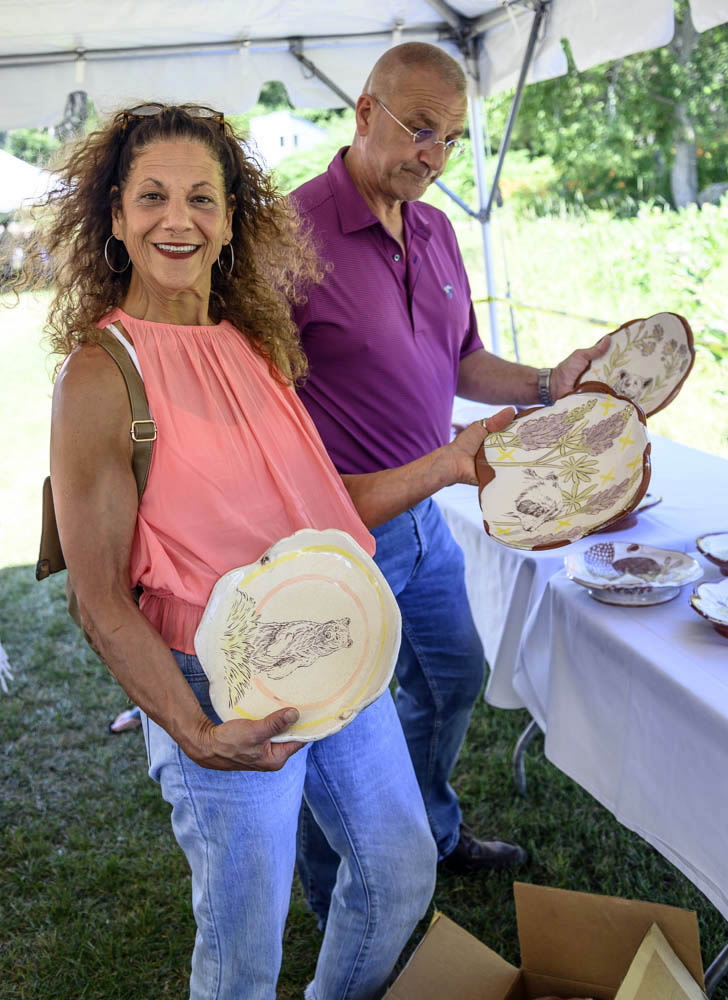
Jan Tessein holds up two plate possibilities while husband Ernie considers yet another option during Salad Days at Watershed Center for the Ceramic Arts in Newcastle on Saturday, July 9. Their daughter, Grace, is the Salad Days artist-in-residence. (Bisi Cameron Yee photo)
“I think this is the best event we’ve ever had,” Watershed Executive Director Fran Rudoff said about the Newcastle ceramic center’s 27th annual Salad Days fundraiser on Saturday, July 9. “After two years people are literally hungry to come back together and be in a community.”
Hundreds of visitors from all over the country gathered at the secluded campus to support the mission of the Watershed Center for the Ceramic Arts, to tour its new studio, to observe artist demonstrations, to shop for work by nationally-recognized ceramic artists, and to purchase one of more than 400 unique plates handcrafted by Salad Days Artist-in-Residence Grace Tessein.
The Salad Days artist-in-residence is an annual residency during which the chosen artist is specifically commissioned to produce and create plates or shallow bowls to be sold at the fundraising event. Applicants submit images of their work and respond to questions about their craft. A panel of professional artists, including some who have held the position in the past, make the final selection in consultation with Watershed staff.
Tessein first came to Watershed for a two-week residency in 2014. While there, she was introduced to the work of artists from previous Salad Days. She said she aspired to achieve that level of craft.
Tessein, who lives in Georgia, started making flora and fauna plates in 2016. For her residency she decided to feature plants and wildlife native to Maine. Her plates are adorned with a wide variety of squirrels, foxes, badgers, groundhogs, mice, bears, and more. Milkweed, which grows abundantly on the Watershed campus, became a favorite motif.
Tessein hand built each plate using bisque molds. She let the clay dry until the pieces were leather hard then dipped them into a white slip, or slurry of liquefied clay, which she let dry to the touch. She then transferred her design onto the surface and carved through the white exterior to expose the terra cotta clay before painting each plate freehand.
Tessein called the entire experience at Watershed transformative, likening it to running a three-and-a-half-month marathon.
“It’s really nice to see the work in public hands and going off to their new homes all over the place,” she said.
“I think her work is beautiful,” Rudoff said. “(Guests) come to the event to pick out a very special plate and Tessein’s drawing is as beautiful as her ceramic art. So I knew that people would respond.” All the plates sold out prior to the event.
Salad Days also provided an opportunity to introduce the public to the newly completed 7,500-square-foot, single-level Windgate Studio. The year-round studio was made possible by a $3 million endowment from the Arkansas-based Windgate Charitable Foundation, the largest gift in Watershed’s history.
The studio includes a large glaze area, and customized workstations. An army of gas, electric, and wood kilns are available just outside the studio doors. One of the original brick kilns from the site’s factory days was salvaged and still stands outside the main entrance.
With a catered lunch, artist demonstrations, and work for sale by more than 30 artists, many of them nationally known, Salad Days is Watershed’s preeminent event according to Rudoff. It has become a summer tradition for many locals to attend and collect each year’s plate.
Elyse Grams is one such. She was an artist-in-residence in 2019 and said Watershed gave her the opportunity to spend two weeks immersed in the small, tightly-knit ceramics community in the area.
“It’s also stupidly pretty,” she said of the surroundings.
Grams said that work left in the surrounding woods by artists throughout the years makes a hike of the grounds seem like visiting an outdoor museum.
Anne Meszkos and Mark Lyman, both previous Watershed board members, came from Arkansas for this year’s celebration. The couple produce gallery-based art fairs and Lyman said they gave a generous gift toward the new building because their business is based on the “fine work” associated with the ceramics and craft communities.
“We felt we had to give back,” he said.
Watershed Center for the Ceramic Arts started life as a brick factory, making use of the rich deposits of clay along Midcoast rivers. In 1986, Watershed co-founders Margaret Griggs, George Mason, Lynn Duryea, and Chris Gustin saw in the factory an opportunity to build a community based around ceramic arts.
Watershed now welcomes more than 100 visiting artists a year, offers workshops by nationally renowned artists, and provides access to its studio and kilns to local artists, students, and educators.
Funds raised during Salad Days help subsidize not only the artist-in-residence program, but also Watershed’s K-8 education initiatives.
For more information, go to watershedceramics.org.



